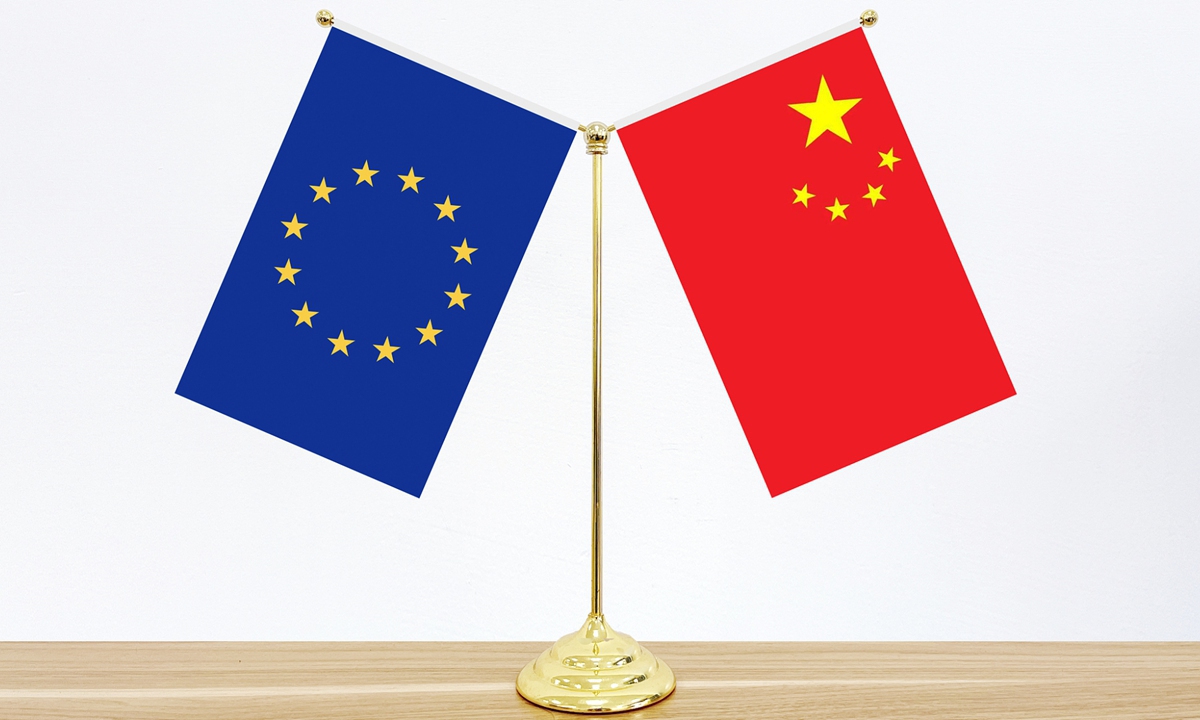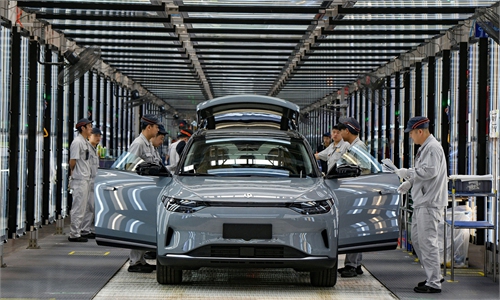China, EU agree to hold further talks over EV tariffs
Two sides reaffirm political commitment to resolve dispute through talks

China EU Photo:VCG
Chinese Commerce Minister Wang Wentao on Friday held a video call with the European Commission (EC)'s Executive Vice-President and Commissioner for Trade Valdis Dombrovskis at the latter's request, during which the two sides agreed to conduct further consultations over the EU's planned additional tariffs on Chinese electric vehicles (EVs).
During the video call on Friday, the two sides took stock of the progress made during the previous round of talks, reaffirmed political commitment to resolve differences through dialogue, and determined that price commitments will continue to be used as a solution for the case, according to a statement from the Chinese Ministry of Commerce (MOFCOM).
Notably, MOFCOM said that the EU side has put forward specific proposals on the price commitment plan and proposed that the technical teams of both sides conduct video consultations over the plan. "China agreed to immediately launch the next phase of consultations and welcomes the EU team to come to China as soon as possible," the statement said.
For its part, the EC also issued a statement about the video call, saying that the two sides took stock of the progress made during eight technical negotiating rounds, as well as significant remaining gaps, and reaffirmed their political commitment to finding a mutually agreeable solution. "The principals agreed that further technical negotiations would take place shortly," the EC statement said.
As of press time on Friday, it remains unclear when the technical talks will take place. But the video call and the agreement on further negotiations came at a critical time, as the EU's additional tariffs are reportedly scheduled to come into force on October 31 unless the two sides find a mutually acceptable solution to resolve the dispute.
The upcoming talks also come after the two sides have already been conducting intensive consultations since September 20, during which positive progress was made in some areas, but major differences remain in issues related to the core concern of Chinese and EU industries, Wang said during the video call on Friday.
"China will unswervingly safeguard the legitimate rights and interests of enterprises, and hopes that the two sides will jointly continue to advance consultations based on the previous phase of consultations, achieve substantive breakthroughs as soon as possible, effectively respond to the expectations of Chinese and EU sectors, and safeguard the common interests of Chinese and EU industries and overall economic and trade cooperation between China and the EU," Wang said.
Commitment to talks
Despite lingering major differences, the door for more negotiations should remain open and continuing to conduct more consultations should remain the main path to resolving the dispute, said Zhao Junjie, senior research fellow at the Institute of European Studies at Chinese Academy of Social Sciences (CASS).
"Both sides should meet each other halfway and refrain from making unreasonable demands, so as to eventually find a mutually acceptable solution. This is the most ideal outcome," Zhao told the Global Times on Friday, adding that the if the EU side does not change its uncompromising stance, it will not lead to a mutually acceptable solution.
During the previous negotiations, the EU side did not demonstrate sufficient sincerity in addressing the core concerns of Chinese and EU industries by making unreasonable demands, not responding positively to sensible offers from the Chinese side and attempting to split up Chinese EV makers during the talks, sources close to the matter told the Global Times last week.
For instance, EU officials sought to conduct separate negotiations with different EV makers, while failing to respond positively to offers made by the Chinese negotiating team, with the China Chamber of Commerce for Import and Export of Machinery and Electric Products (CCCME) representing the whole Chinese EV industry, the sources said.
Highlighting the differences over this matter, the EC statement on Friday cited WTO rules in asserting that its negotiations with the CCCME do not exclude discussions with individual exporters.
However, the Chinese side has stressed that the CCCME is the sole legal representative of the Chinese EV industry during the negotiations, as a dozen Chinese EV makers have signed documents to authorize the chamber as their legal representative.
"The EV companies have already submitted relevant materials to the CCCME. It is completely unnecessary to conduct separate negotiations," a source told the Global Times last week, noting that the EC's investigation and rulings also treated brands under the same company as a whole. "So why the inconsistency? This only complicates the negotiations, wastes energy and undermines the consultation process."
In contrast to the EU's lack of sufficient sincerity, the Chinese side has attached great importance to resolving the dispute through consultations and has made full preparations, said Cui Dongshu, secretary-general of the China Passenger Car Association.
"Moreover, China is on the right side of the dispute," Cui told the Global Times on Friday, noting that the EU's policy not only undermines China-EU cooperation but will also hurt its own interests, particularly the interests of some EU companies that have production bases in China. "So the EU should hope to reduce the impact to a minimum."
The EC is also under growing pressure from officials and industries from some EU member countries. During a speech on Monday, German Chancellor Olaf Scholz again criticized the EC's decision on the EV tariffs, saying "I'm against tariffs that harm us," according to Reuters. Last week, Scholz also called for an agreement with China, while also pointing to skepticism from other EU members toward the EC's tariffs.
"I think there is pressure on the EC from within the bloc," Wu Shuocheng, a veteran automobile industry analyst, told the Global Times on Friday, noting that in addition to the EU auto industry, other EU industries are also concerned about the potential impact from escalating tensions between China and the EU.
During the call on Friday, the two sides also exchanged views on China's trade remedy investigations into relevant EU products such as brandy, pork and dairy products, according to MOFCOM.
"The Chinese side emphasized that the above-mentioned cases were initiated at the request of China's domestic industries and are in compliance with WTO rules and Chinese laws. China will continue to conduct investigations in accordance with laws and regulations and fully safeguard the legitimate rights and interests of all parties," the ministry said in the statement on Friday.


